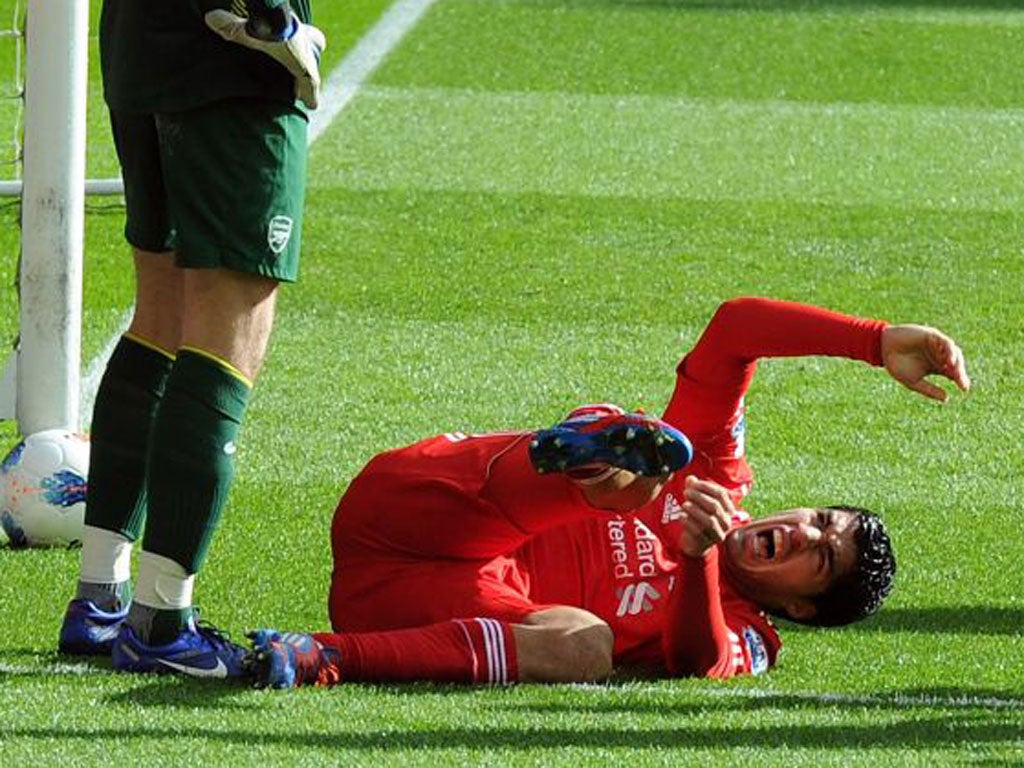The Last Word: Footballers who dive are enacting the fall of man
If you are prepared to win at all costs, the elixir of victory is surely diluted

When you think about it, simulation is the last thing it should be called. For the offence exposes the very core of its author's nature, peeling back the hide of decorum to disclose the ugly, pulsing organs of venality within.
The footballer who dives does so in the certainty that any advantage he might swindle must soon be reimbursed with his own reputation. Some of these guys might be pretty thick, but they have presumably noticed that the referee and spectators are not the sole witnesses to the larceny. Whether or not television evidence should be used for formal, retrospective punishment, it ensures that millions will see you contaminate your own name in slow motion.
As such, you embrace lasting opprobrium as a price worth paying for the fleeting gain of a penalty or red card. If anything, then, the dive describes the fall of man. It represents a wilful, Mephistophelean exchange of the soul for a worldly illusion.
But at least this type of cheating is blatant. A still stranger paradox arises in Lance Armstrong, whose jealousy of his status as paragon has now been piteously explained by the dishonesty upon which it was constructed.
Champions all tell of their addiction to winning. Some of them – including Tony McCoy, perhaps their ultimate byword of probity – literally risk life and limb to be the best. But what of those seduced into equivalent moral jeopardy? If you are prepared to win at all costs, to risk not just your neck but also your honour, then surely the elixir is fatally diluted. Even if everybody else is fooled, even if you try to fool yourself, deep down your status as "the best" will be gnawed by a secret despair.
Viewed as a relatively frivolous fraud, and so deployed more brazenly, the dive does disclose a sort of honesty – a candour, at least – even in deceit. When Luis Suarez falls over, many observers think they already know where they stand. It was his goal-line handball, after all, that denied his sport a momentous World Cup semi-final debut for Africa. Gareth Bale, in contrast, last week forfeited the esteem of many neutrals who had previously reckoned him a wholesome, clean-cut role model.
But role is the word. These are football "players", and we talk of their "performance". All sport is about the theatrical amplification of man's physical, emotional and moral capacities. Just as the great actors chart the full, complex register of human nature, so the sporting stage unstitches its deepest seams. Sometimes, players ham it up – they dive in the box – and everyone can see that they are acting. But sometimes it is impossible to see where Olivier stops and Hamlet starts. And it is those who adhere to that inscrutable margin, between performance and personality, that most transfix the audience. For this is where we find "character".
It was instructive, this week, to read the obituaries of Alex Karras. As a marauding lineman for the Detroit Lions in the 1960s, Karras became cherished and feared as "The Mad Duck". He depended sooner on brains than brawn. "He has inside and outside moves," one opponent said. "A bull move where he puts his head down and runs over you, or he'll just stutter-step you like a ballet dancer." The former wrestler's unruly style on the field was matched by an outspoken, waggish disdain for authority off it. Banned for a handful of inconsequential wagers on NFL games, he never pretended contrition. Soon after his return, he was invited to call the coin toss before a match. "I'm sorry, sir," he told the official. "But I'm not permitted to gamble."
On retiring, Karras embarked on a new career in Hollywood. He will be best remembered as Mongo, who decks a horse with a single punch in Blazing Saddles. Sadly, his death at 77 was preceded by dementia and serious illness, and he had joined a lawsuit of former players against the NFL, over the pulping they took in those years.
In his pomp, however, every aspect of his life channelled the same, overflowing force of personality. The Karras of the canvas, gridiron and studio was plainly the same Karras who captivated so many within the private orbit of his feisty, garrulous wit. It seems fitting that he played football through a fog of myopia, literally blurring the margins of his performance. And also, perhaps, that he should once have introduced smarts and substance to wrestling, a sport mistrusted as sham. Karras was Karras, all the way through.
And maybe we should remember that, next time we see a sportsman who betrays a nature less honest than his own – whether willingly, like the pantomime villains of diving; or not, like Armstrong. As Karras once remarked: "It takes more courage to reveal insecurities than to hide them."
Join our commenting forum
Join thought-provoking conversations, follow other Independent readers and see their replies
Comments